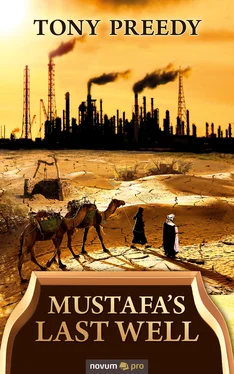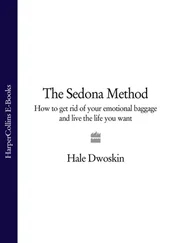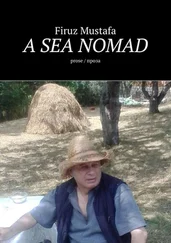The spectators, some now muttering to each other their suspicions of sorcery, backed away in fear for their souls. Others, who did not know him, convinced themselves that Mustafa must be a Jinn in disguise, and in defiance of custom raised their dish-dashes above their knees and ran away from the scene. They left only Issa to support his exhausted friend. Issa, otherwise lost for words after witnessing the healing spectacle, told Mustafa that his choice had won the race by a head, just in front of the al-Jaboo animal.
When the crowd dispersed, Issa, who had with other spectators, been watching Mustafa’s performance, asked, “What did you do to produce that cure?”
“Only Allah knows, for something went from my body that has made me feel weak,” he replied.
Mustafa slowly regained his strength as the friends departed for the farm, where they expected to find Mustafa’s elderly father waiting for news. The old man and his son lived there with no woman, for Mustafa’s mother had died after giving a son to his father in her thirteenth year.
“If only you could do that to me,” Issa lamented.
“I do not know, but there have been other times when I have felt that strange loss of my strength,” replied Mustafa, as he was thinking; “I will try it.”
When they reached the farm, they found no one there. Mustafa said, “Come and lie down here, and I will pretend you are the camel rider.”
Issa obeyed; he had confidence in his friend. He lay on the wicker sleeping frame that sat beneath the palm covered veranda at the front of the house, grinning.
“He is not treating the occasion seriously,” thought Mustafa, as he placed his hand on the lame leg and started to move it over the part that was weak. Immediately he felt the healing sensation start to build. “Do you feel anything yet?” Mustafa asked. Issa was about to say no, but then he felt a strange but pleasant sensation starting to strengthen in his leg. Issa relaxed. Mustafa held his hand steady, even though he continued to feel weakened as the energy transfer intensified. Issa started to become apprehensive, and would have stopped his friend, had he not suddenly lost consciousness. As he felt the healing sensation diminish, Mustafa watched his friend for a reaction, but had to wait several minutes before Issa opened his eyes.
Issa did not know where he was except that the sun was above and shining in his eyes. Then, in the shade of the palms, he saw the familiar beam of palm wood over the doorway to the farmhouse and remembered where he was. “How are you now?” asked Mustafa, concern in his voice.
“Let me get up, and we will see.” Issa swung his legs to place his feet on the floor and started to raise himself from the bed, realising with the utmost pleasure that he had been cured.
Issa departed excitedly to show his father what had happened, and Mustafa entered the house to join his own father. Within the house there was no sign of the old man.
A search amongst the date palms revieled his father’s body. He had died of a heart attack.
***
When Issa arrived home and met his father, the Imam, he showed him what Mustafa had done and told him how the young camel rider had also been healed. The Imam, shocked by these events, muttered a prayer, and told Issa to take him to Mustafa, but before they could set out, Mustafa came into their house to tell the Imam of his father’s death.
After giving condolences to Mustafa and agreeing to arrange for the burial of his father, the Imam became serious. His reaction was ambivalent; gratitude on one hand, whilst on the other hand he was concerned that Mustafa had been blasphemous; had not Allah punished himself or his son for some evil in a past life? The Imam pressured Mustafa to refrain from future attempts to heal. He told of Jesus, the man whose followers claimed him to be the son of Allah, who came six centuries before Allah’s messenger, the prophet Mohamed. Jesus possessed similar powers, for which he was crucified by the Romans who occupied the land. Later, he was worshipped by the Christians in Europe, the same tribes who sent crusaders to recapture the lands conquered by the followers of Mohamed, and burned alive, as witches, all those who emulated Jesus.
The Imam warned, “By continuing to defy the will of Allah, by healing those He had caused to suffer, Mustafa, unless you are the Mahdi, sent by Allah, and that is most unlikely, you risk death for blasphemy at the hands of religious zealots.” Mustafa was visibly frightened by these words. “Promise me you will never attempt such healing again, or I will not be able to protect you from those who would have you killed.” Mustafa agreed.
***
From that time Mustafa confined his use of torsion wave energy (not that he knew anything of this “science”) to his other skill, locating underground sources of water. It was, he knew, only his ability to provide this vital service that had protected him from the Islamic extremists, who needed minimal justification to proclaim a fatwa for his death. To dispel any doubts, as soon as his father had been buried, he crudely engraved the beam above the entrance to his house with a sign declaring “water finding” to be his only business.
Chapter 2
It was the year 1234 Hijri: AD 1819
Queen Victoria is born, along with British democracy, after the massacre of the Peterloo protesters in Manchester
Some who had known Mustafa al-Wyly since childhood called him a healer, after word spread of his performance at the camel race, and others called him a mystic, but the fear of fatwa made him reclusive from all men. The farm lay outside the coastal town that was the capital of the Emirate of Naamlah. Now suffering the ravages of sixty years, his back was bent, and the deterioration of his lungs, due to a fondness for the hookah, caused him difficulty breathing. His reputation came about when, as a boy, he demonstrated that he was blessed with an unnatural power; today this is believed to have been the ability to harness the energy of torsion waves, by which he was able to correct errors in the DNA of his patients – but in his country, at that time, it was considered sorcery.
Naamlah lay on the southern coast of the Persian Gulf, separated from its eastern neighbour, the small country of Haqum, by a natural geological fault known as al wadi al kabier, the great dry river. This stretched from the mountains, which lay several hundred miles inland, to the south, and out into the sea. Some claimed that occasionally, when storms occurred in the mountains, the wadi would carry water to the sea, but no one living could recall such an event. The Naamlahn side of the sea was shallow and famous for pearl-bearing oysters, which were relatively easy to harvest. On the eastern side, the waters of their neighbours were deep, and any oysters that lived there were beyond the range of divers. Naamlah prospered on trade whilst the neighbours, who were still mostly nomadic, subsisted only on their flocks of goats and sheep, which they exported to Persia through their small seaport. Later generations on both sides of the border would have hopes of oil being discovered in their land, as it would be in some other Gulf countries.
***
Mustafa never took a wife because he was only attracted to young men. His adult life was, therefore, one of frustration, because the Prophet gave no advice in such circumstances and such relationships were thus declared either as sodomy or non-existent by the religious men. He consulted the Imam, who said it was his duty to father children, but Mustafa found the prospect distasteful. When he had aged and become unfit to dig wells, nor pick dates, he decided to purchase two slaves. He found that the bids for physically fit specimens at the auction were beyond his means but when two young Somali brothers were displayed, a plan came to mind. They were both displaying signs of ill health; other potential slave owners had rejected Hassan because he had a withered arm, and Salim was considered defective because of a persistent cough. Mustafa, therefore, bought them both for a pittance and installed them at his farm. Ever since he had healed the lame jockey, he had yearned to attempt another healing. He saw the brothers as his opportunity to covertly experiment with his mystic power. In defiance of his promise as a boy to the now-dead Imam, he successfully used his healing technique to convert the slaves into healthy, strong workers. The boys therefore felt an uncharacteristic obligation of loyalty towards their owner, both for allowing them to stay together and for healing them.
Читать дальше












